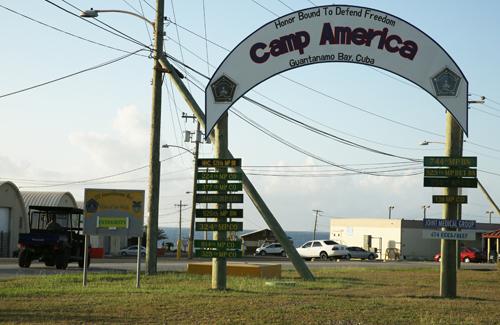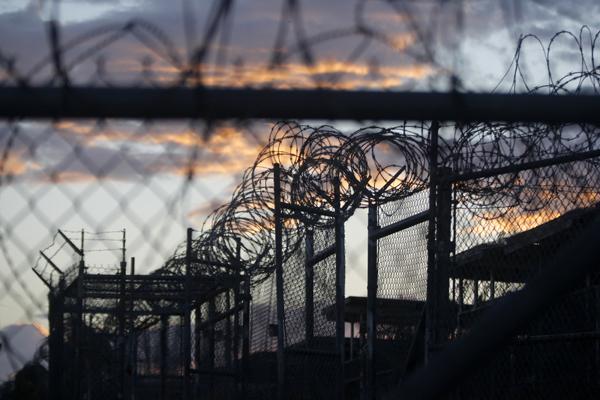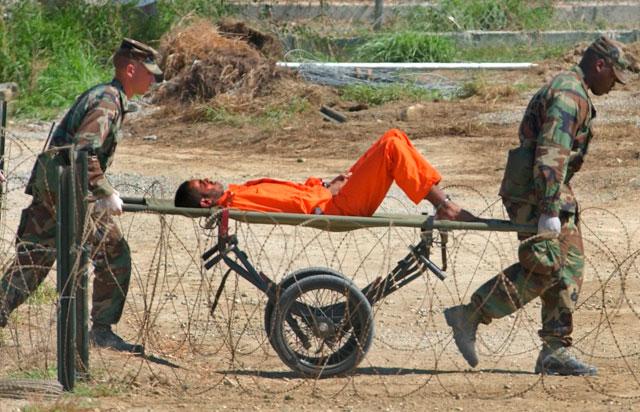You are here
US sends nine Yemeni prisoners from Guantanamo Bay to Saudi Arabia
By Reuters - Apr 17,2016 - Last updated at Apr 17,2016

In this photo taken February 2, the entrance to Camp America is seen at US Guantanamo Naval Base, Cuba (AP photo)
WASHINGTON — The United States on Saturday transferred nine Yemeni men to Saudi Arabia from the US military prison at Guantanamo, including an inmate who had been on a hunger strike since 2007, under a long-sought diplomatic deal between Washington and Riyadh, US officials said.
The transfer, which took place just days before President Barack Obama's visit to Saudi Arabia for a summit of Gulf Arab allies, marked the latest step in his final push to close the controversial detention centre at the US naval base in Cuba before he leaves office in January 2017.
The Saudis agreed, after lengthy negotiations that at one point involved Obama and Saudi King Salman, to take the nine Yemenis for resettlement and put them through a government-run rehabilitation programme that seeks to reintegrate militants into society, the officials said.
The group announced by the Pentagon was the largest shipped out of the Guantanamo Bay prison since Obama rolled out his plan in February aimed at shutting the facility. But he faces stiff opposition from many Republican lawmakers as well as some fellow Democrats.
There are now 80 prisoners at Guantanamo, most held without charge or trial for more than a decade, drawing international condemnation.
The most prominent of the transfers was Tariq Ba Odah, a 37-year-old Yemeni whom the military had been force-feeding daily since he went on a hunger strike in 2007. His legal team said he was down to 74 pounds, losing about half of his body weight.
Ba Odah's lawyer, Omar Farah, said the US government had "played Russian roulette" with his client's life and that his transfer "ends one of the most appalling chapters in Guantanamo's sordid history”.
His case was a source of legal wrangling between the US Department of Justice and his lawyers, who had unsuccessfully sought his release on humanitarian and medical grounds, and also created divisions within the Obama administration.
Transfers precede Obama's visit
The transfers took place as Obama prepared to visit Saudi Arabia on Wednesday and Thursday for a summit with the Gulf Cooperation Council at a time when US-Saudi relations have been strained by the nuclear deal with Iran, their Shiite regional rival, and what Riyadh sees as a weak US response to Syria's civil war.
The Saudis have also threatened to sell of hundreds of billions of dollars' worth of American assets should the US Congress pass a bill that could hold the kingdom responsible for a role in the September 11, 2001 attacks, The New York Times reported.
A US official said the transfer — the result of years of negotiations, including an Oval Office appeal by Obama to the visiting Saudi monarch in September and visits to the kingdom by US Secretary of State John Kerry — was not orchestrated for Obama's trip and the timing was a coincidence.
Republicans have expressed opposition to such transfers, voicing concern that more released Guantanamo prisoners will return to militant activities.
But the transfer was considered a breakthrough since Riyadh had long resisted taking any non-Saudi nationals from the prison.
All nine men have family ties in Saudi Arabia, which borders Yemen. The Obama administration has ruled out sending Yemenis to their homeland because it is engulfed in civil war and has an active Al Qaeda branch.
"The United States is grateful to the government of the kingdom of Saudi Arabia for its humanitarian gesture," the Pentagon said in a statement.
Guantanamo prisoners were rounded up overseas when the United States became embroiled in wars in Iraq and Afghanistan following the September 11, 2001, attacks on New York and Washington. The facility, opened by Obama's predecessor George W. Bush, came to symbolise aggressive detention practices that opened the United States to accusations of torture.
Obama's plan for shuttering the facility calls for bringing the several dozen remaining prisoners to maximum-security prisons in the United States. US law bars such transfers to the mainland but Obama has not ruled out using executive action to do so.
Ba Odah, who was captured by the Pakistani army along the Afghan border and was accused of receiving weapons training in order to fight with the Taliban, had been force-fed by nasal tube since he stopped taking solid food in protest at his detention. He was cleared for transfer in 2009.
Pentagon officials had said he was receiving proper care. But his case was seen, until a recent uptick in transfers, as evidence of the Pentagon resisting Obama's efforts to close the detention center.
The other prisoners involved in the transfer were identified as: Umar Abdullah Al Hikimi, Abdul Rahman Mohammed Saleh Nasir, Ali Yahya Mahdi Al Raimi, Muhammed Abdullah Muhammed Al Hamiri, Ahmed Yaslam Said Kuman, Abd Al Rahman Al Qyati, Mansour Muhammed Ali Al Qatta, and Mashur Abdullah Muqbil Ahmed Al Sabri.
They were among a group of lower-level inmates, now numbering 26 and mostly Yemenis, who have been cleared for transfer by a US government inter-agency task force. US officials have said they expect to move out all members of that group by this summer.
Related Articles
WASHINGTON — The Pentagon on Monday announced the transfer of two Libyan inmates from the Guantanamo Bay detention centre to Senegal, the la
WASHINGTON — Fifteen Guantanamo Bay detainees have been transferred to the United Arab Emirates, the largest such release in years, the Pent
WASHINGTON — Despite a flurry of last-minute releases from Guantanamo Bay, President Barack Obama is set to fail in his eight-year quest to













